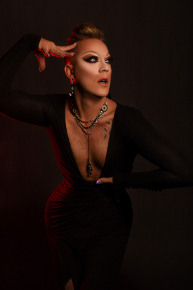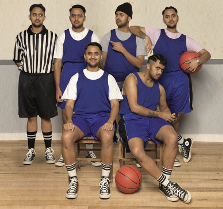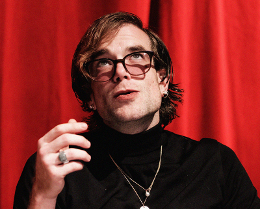Krishna Istha: Beast at Fringe Perth
- Details
- Written by: Greg Letts
In these times of gender fluidity, pan-sexuality and the LGBT+ alphabet, you could be forgiven for feeling a bit confused about it all. What's the correct pronoun? Which toilets do trans people use? Do they still have their original naughty bits?
Never fear, Krishna Istha (25) – self confessed fence sitter and testosterone taking transgender bisexual – is here at The Blue Room for Fringe World 2020 to answer all your questions. Well, actually Krishna isn't here to do that, but they won't answer them in such a way that you'll learn a thing or two and have a laugh at the same time.
Maureen: Harbinger of Death at Fringe Perth
- Details
- Written by: Nita Teoh
As I stepped into The Blue Room Theatre for their latest performance, the nearby Perth Cultural Centre was abuzz with people partaking in Fringe Perth activities.
With the title “Maureen: Harbinger of Death”, I was curious about what might be in store, with the promo materials describing the play as one that explores the themes of friendships – in particular with older women, inter-generational relationships, ageing, and death - told through a queer lens.
The audience is transported to an apartment in Kings Cross – it is a simple set with solo performer Jonny Hawkins (a WAPAA graduate) at the fore. One minute he is briefly introducing us to the character of Maureen and the next he is Maureen sitting in the lounge room of her apartment. A quick change into a dress and earrings and we are off and running.
Me and My Divas at Fringe Perth
- Details
- Written by: Nita Teoh

There was a fresh summer breeze in operation at The Woodside Pleasure Garden as we waited in line and watched the ebb and flow of Perth Fringe Festival goers passing by.
The queue of people quickly built up as we patiently waited to enter the Spiegeltent to watch Me & My Divas.
They tell you to enter the Lotterywest De Parel Spiegeltent to leave your troubles behind and that is exactly what we did.
Clutching her Diva Bible, Velma Celli - "The UK's Queen of Live Vocal Drag", started off her evening performance with a bang, showcasing some well known diva tracks, accompanied by her music director Joe Louis Robinson.
Things to do around Yanchep National Park
- Details
- Written by: Bob Figg

As fires raged through Yanchep National Park in December, eventually blazing their way to Two Rocks and beyond, a little dark humour was in order as residents feared the worse.
One local (in fact me) took to Facebook to assure friends around the world that while our house was safe, what was even more important was that the magnificent fire-fighters, both professional and volunteers, had saved the Yanchep Inn.
Overseas and interstate connections were especially pleased. They regularly see a Friday post from me sitting in the beer garden of the Inn, situated in the Yanchep National Park, with kangaroos, 28s and other wildlife hoping in vain for crumbs.
In a state famed for its road trips taking days or weeks, Yanchep is a (long) stone’s throw from the city. Just 45 minutes north of the Perth CBD the national park features on a few day trip tour rosters too, but it is an easy drive if you hire a car.
La Belle Époque at Perth Festival
- Details
- Written by: Greg Letts

La Belle Époque is the sort of film that only the French could pull off – a heady mix of modern times and nostalgia – sexy, smart and utterly charming.
After viewing the trailer, I was mildy interested in coming to watch the movie. The premise wasn't fully clear, but seeing as I usually find anything with Daniel Auteuil quite enjoyable, I was willing to give it a go.
After settling in at the Somerville among the pines and with our premium on-site pizza from Charlies (two thumbs up for the field mushroom one), we put on the mozzie repellent (a must!) and waited for the trailers to end.
When La Belle Époque finally began, the opening scene gave me a brief moment of panic before everything came together and the magic began.
Attempting to summarise the plot of La Belle Époque risks ruining the experience for others, so I'll simply say that this a wonderfully entertaining and enjoyable film, showing that even when people change (or when they don't!), love still remains eternal. But love is not always simple or easy!
Portrait of a Lady on Fire at Perth Festival
- Details
- Written by: Nita Teoh

Director and writer Céline Sciamma’s latest romantic movie Portrait of a Lady on Fire revolves around the story of artist Marianne (Noémie Merlant), who is commissioned by the mother of a bride to be to paint a secret portrait of her daughter Héloïse (Adèle Haenel), to give to her future husband.
As the painting progresses, Marianne and Héloïse become better acquainted and form a strong emotional and sensual bond.
Set in the 1770’s in France, Portrait of a Lady on Fire brings to the fore some interesting issues that women had to face during those times – lack of recognition for their chosen vocations (Marianne as an artist), restricted social freedom, repressive public morals and more.

